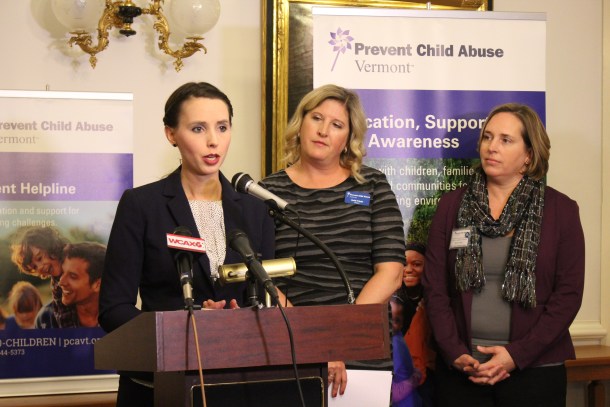Scott Signs Bills Removing Statute of Limitations for Child Sexual Abuse Claims
By Xander Landen
Gov. Phil Scott last week signed a new law that removes the time limit for victims of child sexual abuse to bring civil claims against their abusers. Scott also signed a bill that will extend the statute of limitations for criminal offenses including manslaughter and sexual exploitation of a vulnerable adult. The bill eliminating the six-year statute of limitations for civil child sexual abuse cases, H.330, was a priority for the House Judiciary Committee this year. It was largely inspired by a December conference in which Rachael Denhollander, a former gymnast and the first woman to publicly accuse former USA Gymnastics team doctor Larry Nassar of sexual assault, addressed Vermont officials at the Statehouse. Denhollander pointed to the statute of limitations as a key problem for adjudicating child sexual abuse: often, survivors can’t process what’s happened to them – let alone decide to come forward – until it’s too late. Most criminal charges related to child sexual abuse charges have 40 year statutes of limitations, or no statutes of limitations at all. But under the prior law, victims had only six years to bringing civil claims against their abusers. Organizers including the Vermont Network Against Domestic and Sexual Violence pushed this session to eliminate the statute of limitations for civil claims in child abuse cases. Rep. Martin LaLonde D-South Burlington, the vice chair of the judiciary committee and a sponsor of the legislation said the new law will allow victims of child abuse to seek justice in the courts when they are “finally able and ready to come forward.” “It really is to allow the victims the opportunity to hold their abusers accountable, and find some closure for that early childhood sexual abuse,” LaLonde said. “It shifts the cost of the abuse from the victims to the abuser.” Advocates for victims of child sexual abuse have praised the new law.
Sarah Robinson, the deputy director of the Vermont Network Against Domestic and Sexual Violence, said the six-year statute of limitations did not reflect “the timeline that it takes for survivors to often recognize the impacts of sexual abuse.” “This law is really going to open up the avenues for victims to seek justice on a timeline that is related to their healing,” she said. She added that the law also allows survivors to bring claims against institutions, organizations or companies that permitted, or perpetuated child sexual abuse. The Survivors Network of those Abused by Priests said H.330 is one of the strongest statute of limitations reforms for victims in the country. “By opening a ‘window to justice’ and allowing survivors whose cases were previously barred by [statutes of limitations] to be heard in court, important information can be exposed that can help create safer, more informed communities,” the organization wrote in a statement. “We hope that other legislators around the country will look to Vermont as an example as they too begin to take up [statute of limitation] reform in their own states.” The other law signed last week, H.511, eliminates the statute of limitations for crimes including manslaughter and sexual exploitation of a vulnerable adult. The new law moves the statute of limitations for manslaughter from six to 40 years. LaLonde said the low statute of limitations for manslaughter can make it hard for prosecutors in Vermont to bring homicide cases. Newer forensic technology has made it easier for authorities to link perpetrators to older homicide cases, which is part of the reason the Legislature sought to update the state’s criminal code this year. “With new kind of technology like DNA technology … there’s other ways that years after an event somebody can be found to have committed an offense,” LaLonde said. After signing the bills last week, Scott praised lawmakers for updating Vermont’s criminal and civil laws. “Together, these laws give victims greater opportunity to seek justice, better recognizing the complex nature of these specific crimes and giving victims and their families more tools to achieve the justice they deserve,” Scott said in a statement.
|
.
Any original material on these pages is copyright © BishopAccountability.org 2004. Reproduce freely with attribution.

